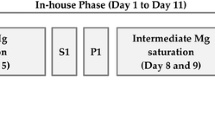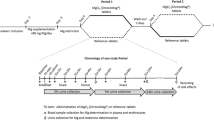Abstract
This study aimed to investigate the short-term effects of three magnesium (Mg) dietary supplements containing mineral immediately available for absorption on Mg biochemical status indices (ionized and total Mg), as well as their effects on electrolytes levels in healthy female young adults (n = 61). After a 10-days intervention period supplementation with powder/granulate containing Mg oxide led to an increase in both ionized Mg concentration and % in total Mg in comparison with the baseline. Supplementation with Mg citrate was associated with the significant increase in % of ionized fraction and decrease in serum total Mg concentration. By contrast, among participants consuming Mg carbonate in the form of effervescent tablets ionized Mg concentration and % in total Mg decreased, without detectable changes in serum total Mg. In conclusion, after the short-term supplementation period, Mg oxide demonstrated superior bioavailability compared to the other examined Mg supplements without affecting other minerals’ levels.


Similar content being viewed by others
Data availability
Data available on request due to restrictions eg privacy or ethical.
Code availability
Not applicable.
References
Ahmed F, Mohammed A (2019) Magnesium: the forgotten electrolyte—a review on hypomagnesemia. Med Sci 7(4):56
Altura BT, Altura BM (1991) Measurement of ionized magnesium in whole blood, plasma and serum with a new ion-selective electrode in healthy and diseased human subjects. Magnes Trace Elem 10(2–4):90–98
Authority, European Food Safety (2006) Tolerable upper intake levels for vitamins and minerals. Scientific Committee on Food.
Authority, European Food Safety (2017) Dietary reference values for nutrients Summary report. EFSA Supporting Publications 14(12):e15121E
Barbagallo M et al (2010) Oral magnesium supplementation improves vascular function in elderly diabetic patients. Magnes Res 23(3):131–137
Belluci MM et al (2020) Severe magnesium deficiency compromises systemic bone mineral density and aggravates inflammatory bone resorption. J Nutrit Biochem 77:108301
Blancquaert L, Vervaet C, Derave W (2019) Predicting and testing bioavailability of magnesium supplements. Nutrients 11(7):1663
Cazzola R et al (2020) Going to the roots of reduced magnesium dietary intake: a tradeoff between climate changes and sources. Heliyon 6(11):e05390
Committee, Dietary Guidelines Advisory (2020) Scientific report of the 2020 Dietary Guidelines Advisory Committee: advisory report to the secretary of agriculture and the secretary of health and human services. Agricultural Research Service.
Costello RB, Nielsen F (2017) Interpreting magnesium status to enhance clinical care-key indicators. Curr Opin Clin Nutr Metab Care 20(6):504
Cuadrado-Soto E et al (2020) Usual dietary intake, nutritional adequacy and food sources of calcium, phosphorus, magnesium and vitamin D of Spanish children aged one to< 10 years. findings from the EsNuPI study. Nutrients 12(6):1787
De Baaij JHF, Hoenderop JGJ, Bindels RJM (2015) Magnesium in man: implications for health and disease. Physiol Rev. https://doi.org/10.1152/physrev.00012.2014
Dibaba DT et al (2017) The effect of magnesium supplementation on blood pressure in individuals with insulin resistance, prediabetes, or noncommunicable chronic diseases: a meta-analysis of randomized controlled trials. Am J Clin Nutr 106(3):921–929
Dickinson A, MacKay D (2014) Health habits and other characteristics of dietary supplement users: a review. Nutr J 13(1):1–8
Elmadfa I, Meyer AL, Nowak V (2009) Content. Ann Nutr Metab 55(Suppl. 2):1–40
Ford ES, Mokdad AH (2003) Dietary magnesium intake in a national sample of US adults. J Nutr 133(9):2879–2882
Gröber U, Schmidt J, Kisters K (2015) Magnesium in prevention and therapy. Nutrients 7(9):8199–8226
Gurinovic M et al (2018) Development, features and application of DIET ASSESS & PLAN (DAP) software in supporting public health nutrition research in Central Eastern European Countries (CEEC). Food Chem 238:186–194
Gurinovic M et al (2016) Establishment and advances in the online Serbian food and recipe data base harmonized with EuroFIR standards. Food Chem 193:30–38
Intakes, Institute of Medicine Standing Committee on the Scientific Evaluation of Dietary Reference (1997) Dietary reference intakes for calcium, phosphorus, magnesium, vitamin D, and fluoride. National Academies Press, US.
Jacques PF et al (1993) Comparison of micronutrient intake measured by a dietary questionnaire and biochemical indicators of micronutrient status. Am J Clin Nutr 57(2):182–189
Kamiński M, Kręgielska-Narożna M, Bogdański P (2020) Determination of the popularity of dietary supplements using google search rankings. Nutrients 12(4):908
Kappeler D et al (2017) Higher bioavailability of magnesium citrate as compared to magnesium oxide shown by evaluation of urinary excretion and serum levels after single-dose administration in a randomized cross-over study. BMC Nutr 3(1):7
Kazaks AG et al (2010) Effect of oral magnesium supplementation on measures of airway resistance and subjective assessment of asthma control and quality of life in men and women with mild to moderate asthma: a randomized placebo controlled trial. J Asthma 47(1):83–92
Lindberg JS et al (1990) Magnesium bioavailability from magnesium citrate and magnesium oxide. J Am Coll Nutr 9(1):48–55
Mishra S et al (2021) Dietary supplement use among adults: United States, 2017–2018.
Muñoz-Garach A, García-Fontana B, Muñoz-Torres M (2020) Nutrients and dietary patterns related to osteoporosis. Nutrients 12(7):196
Newhouse IJ, Finstad EW (2000) The effects of magnesium supplementation on exercise performance. Clin J Sport Med 10(3):195–200
Nielsen FH, Johnson LAK, Zeng H (2010) Magnesium supplementation improves indicators of low magnesium status and inflammatory stress in adults older than 51 years with poor quality sleep. Magnes Res 23:158–168
Nikolic M et al (2018) The development and validation of food atlas for portion size estimation in the Balkan region. Front Nutr 5:78
Olza J et al (2017) Reported dietary intake, disparity between the reported consumption and the level needed for adequacy and food sources of calcium, phosphorus, magnesium and vitamin D in the Spanish population: findings from the ANIBES study. Nutrients 9(2):168
Schuchardt JP, Hahn A (2017) Intestinal absorption and factors influencing bioavailability of magnesium-an update. Curr Nutr Food Sci 13(4):260–278
Rooney MR et al (2020) Circulating ionized magnesium: comparisons with circulating total magnesium and the response to magnesium supplementation in a randomized controlled trial. Nutrients 12(1):263
Siener R, Jahnen A, Hesse A (2011) Bioavailability of magnesium from different pharmaceutical formulations. Urol Res 39(2):123–127
Tang C-F et al (2020) Possibility of magnesium supplementation for supportive treatment in patients with COVID-19. Eur J Pharmacol 886:173546
Walker AF et al (2003) Mg citrate found more bioavailable than other Mg preparations in a randomised, double-blind study. Magnes Res 16(3):183–191
Welch AA et al (2009) Variation in intakes of calcium, phosphorus, magnesium, iron and potassium in 10 countries in the European Prospective Investigation into Cancer and Nutrition study. Eur J Clin Nutr 63(4):S101–S121
Závaczki Z et al (2003) Magnesium-orotate supplementation for idiopathic infertile male patients: a randomized, placebo-controlled clinical pilot study. Magnes Res 16(2):131–136
Zhan J et al (2020) Circulating ionized magnesium as a measure of supplement bioavailability: results from a pilot study for randomized clinical trial. Nutrients 12(5):1245
Acknowledgements
The authors wish to express their profound appreciation to Nova Biomedical (Waltham, MA, USA) for providing access to Stat Profile Prime Plus Critical Care blood gas analyzer and reagents' donation. Nevertheless, the sponsor had no role in the study design, data collection and analysis, the decision to publish or preparation of the manuscript. We gratefully thank all the students who volunteered to participate in the study for their cooperation, time and motivation. We particularly thank Agnes Kadvan for IT support and technical assistance.
Funding
The authors have no relevant financial or non-financial interests to disclose.
Author information
Authors and Affiliations
Contributions
Conceptualization, NI and NM; methodology, NI, NM, MZ, BR; software, NM; validation, MZ, BDJ, SI, BR; formal analysis, MZ, DK and BDJ; writing—original draft preparation, NI, NM and BR; writing—review and editing, MZ, DK, BDJ and SI; visualization, MZ; supervision, DK; project administration, NI. All authors have read and agreed to the published version of the manuscript.
Corresponding author
Ethics declarations
Conflict of interest
The authors have no conflicts of interest to declare that are relevant to the content of this article.
Ethical approval
All procedures followed were in accordance with the ethical standards of the responsible committee on human experimentation (institutional and national) and with the Helsinki Declaration of 1964 and its later amendments. Informed consent was obtained from all patients for being included in the study.
Informed consent
Informed consent was obtained from all patients for being included in the study.
Consent for publication
All authors have read and approved the final submitted manuscript. We certify that this manuscript is original and not previously published in any form including on preprint servers, nor is it being considered elsewhere.
Additional information
Publisher's Note
Springer Nature remains neutral with regard to jurisdictional claims in published maps and institutional affiliations.
Rights and permissions
About this article
Cite this article
Ivanovic, N.D., Radosavljevic, B., Zekovic, M. et al. Effects of short-term magnesium supplementation on ionized, total magnesium and other relevant electrolytes levels. Biometals 35, 267–283 (2022). https://doi.org/10.1007/s10534-022-00363-y
Received:
Accepted:
Published:
Issue Date:
DOI: https://doi.org/10.1007/s10534-022-00363-y




